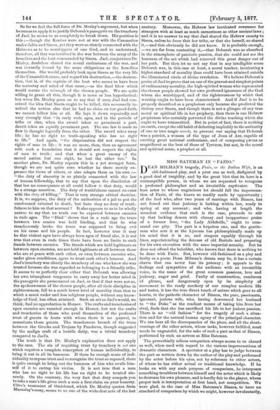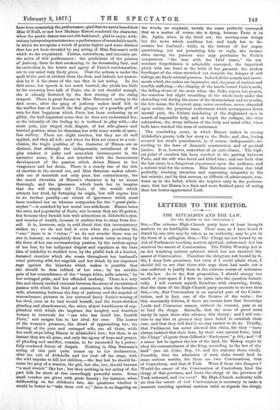MISS BATEMAN IN " FAZIO."
DEAN MILMAN'S tragedy, Fazio, or the Italian Wife, is an old-fashioned play, and a poor one as well, disfigured by a good deal of turgidity, and by the great blot that its hero is a contemptible person, in whom we are requested to recognise a profound philosopher and an irresistible captivator. The best actor to whose ungracious lot should fall the impersona- tion of Fazio, of the knave so readily made by opportunity ; of the fool who, after two years of marriage with Bianca, has not found out that jealousy is lurking within her, ready to spring at any moment ; and who, having at length the soundest evidence that such is the ease, proceeds to stir up that lurking demon with clumsy and inopportune praise of a former love, "the Lady Aldabella," ought to com- mand our pity. The part is a hopeless one, and the gentle- man who acts it at the Lyceum has philosophically made up his mind that it is so, and simpers equably through his lines, superintending the decease of old Bartolo and preparing for his own execution with the same impartial serenity. But he does not offend the beholder, who knows that there is nothing to be done with Fazio. But, however old-fashioned as a play and faulty as a poem Dean Milman's drama may be, it has a certain charm that can never lose its potency ; it appeals to the feelings and sympathies of the audience with an irresistible voice, in the name of the great common passions, love and jealousy, anger and grief. Faulty of construction, cumbrous of phrase, and dangerously open by its simplicity of movement to the ready mockery of our complex modern life and tastes, it has the true direct touch of nature which goes to all hearts, in the pathetic character of Bianca, the pure, passionate, ignorant, jealous wife, who, having denounced her husband to "the Duke" as the readiest means of taking him from her rival, finds that she has sacrificed his life to her jealous passion. There is no "old fashion" for the tragedy of such a situa- tion and for the natural human agony of the principal character. We can bear all the discrepancies of the piece, and all the short- comings of the other actors, whose tasks, however fulfilled, must needs be ungrateful, for the sake of such a part as that of Bianca, performed by such an actress as Miss Bateman.
The proverbially odious comparison always seems to us absurd as well, when used with regard to the various impersonations of dramatic characters. A spectator at a play has to judge between the part as written down by the author of the play and performed by the actor before his eyes, not by reference to other actors, of whom he has either actual or traditional knowledge. If he looks on with any such purpose of comparison, he interposes something troublous between himself and the actor which is likely to decrease his own pleasure, and is hardly fair to the player, whose proper task is interpretation at first hand, not competition. We were glad, in the case of Miss Bateman's Bianca, to have no standard of comparison by which we might, however involuntarily, have been measuring the performance; glad that we never heard how Miss O'Neill, or saw how Madame Ristori rendered the character, when the poetic drama was not old-fashioned ; glad to enjoy, with- out any interposing reminiscence, a performance of remarkable merit, in which we recognise a touch of genius higher and more distinct than has yet been revealed by any acting of Mies Bateman's with which we are acquainted. Pathos, naturalness, and intensity are the notes of this performance ; the gradations of the passion of jealousy, from its first awakening, to its devastating fury, and its extinction in the terror and agony of Fazio's condemnation, are to our mind very finely given. That the actress is under the spell of the part is evident from the first, and indeed, her posses- sion by it is the cause of the one flaw in her acting. In the first scene, her speech is too much hurried, she yields too little to the caressing love-talk of Fazio, she is not cheerful enough, she is already fluttered by the first stirring of the rising tempest. There is great finesse in Miss Bateman's acting in the first scene, after the pang of jealousy makes itself felt, in the sudden fear of herself, the first glimpse of a possible gulf of ruin for that happiness which Fazio has been reckoning up so glibly, the half-impatient sense that he does not understand her, or the intensity of the feeling he is inclined to play with,—the acute pain, just tinged with disgust, of her side-glance and hurried gesture, when he dismisses her with some words of taste- less raillery. These are slight touches, but they are all well applied, and they all tell ; and when the first act comes to a con- clusion, the tragic qualities of the character of Bianca are so distinct, that although the indispensable curtailment of the play renders it jerky and somewhat inconsequent in the -narrative sense, it does not interfere with the harmonious development of the passion which drives Bianca to her -vengeance and her doom. There is a steady rise of the tide of emotion in the second act, and Miss Bateman makes admir- able use of materials not only poor, but contradictory, for the moral elevation of Biane,a's character is by no means thorough, and the ignorance which leads her to imagine that she will simply rid Fazio of the wealth which attracts her rival, by betraying its origin, but will expose him to no further penalty—an extent of ignorance which must have rendered her an irksome companion for the "great philo- sopher "—is matched by her moral one-sidedness. Bianca hates the state and popularity of Fazio, not because they are ill-gotten, but because they furnish him with attractions in Aldabella's eyes, and wearies of wealth, because it enables him to stray from her- self. It is, however, only in cold blood that this inconsistency strikes us ; we do not feel it even when she proclaims the -46 awe " there is in "virtue ;" we do not wonder there was no awe in honesty, so completely does the actress carry us away by the force of her one overmastering passion, by the restless agony of her fear, by her indignant disgust and repulsion at the bare idea of infidelity to wedded love, by the pitiful look of a hunted, harassed creature which she wears throughout her husband's cruel paltering with her anguish and her dread, by her impotent cage against the injustice which makes it possible that -she should be thus robbed of her own ; by the terrible pain of her remembrance of the "tempo felice, nella miseria," by her outraged pride, and her offended modesty. There is a very fine and closely studied contrast between the scene of unrestrained passion with which the third act commences, when the forsaken wife, alternating between the fury of jealousy and the anguish of remembrance, pictures to her tortured fancy Fazio's wooing of her rival, even as he had wooed herself, and the heart-stricken pleading and abandonment, the utter, abject humbleness of sup- plication with which she implores the haughty and heartless woman to intercede for "one who has loved her, Geraldi Fazio," and resigns him to her rival for ever. The horror of the woman's presence, the dread of approaching her, the loathing of the pure and outraged wife, are all there, while her swift steps bring Bianca to Aldabella's feet ; but then, in an instant they are all gone, and only the agony of hope and prayer, of pleading and sacrifice, remains, to be succeeded by a power- fully-rendered frenzy of despair. Nothing in Miss Bateman's .acting of this part quite comes up to her declamation, -after the exit of Aldabella and her rush off the stage, with the wild impulse to kill her children,—the boy lest he should be- come the prey of a wanton, the girl, lest she, too, should become "a mad wretch" like her ; bat then nothing in her acting of the part falls far short of this exceedingly powerful scene. Some small touches are given with great beauty ; for instance, when -deliberating on the children's fate, she questions whether it would be better to "take them with us," there is no lingering on
the words, no emphasis, merely the sense perfectly conveyed that as a matter of course she is dying, because Fazio is to die. Again, when, in the third act, the serving-man brings her the news which maddens her, and leads her to de- nounce her husband ; while, in the torrent of her anger, questioning, yet not permitting Min to reply, she enume- rates among the persons who may perchance be Fazio's companions "the man with the brief name," the mo mentary forgetfulness is admirably conveyed, the impatient pluck with one hand at the folds of her garment, the shaken forefinger of the other stretched out towards the bringer of evil tidings, are finely natural gestures. Indeed all the sounds and move- ments which she makes are impressive and eloquent of various and terrible suffering,—the clinging of the hands round Fazio's neck, the falling-down of the arms when the Duke rejects her prayer, the ceaseless but slight trembling of the whole body under the shrouding veil during the scene of the denunciation and its results, the low moan, the frequent gasp, never overdone, never obtruded upon notice, the perpetual restlessness which accompanies fierce mental pain, the forlorn wandering of the frightened eyes in search of impossible help, and at length the collapse, the utter exhaustion, the stony stillness of the body and mind alike, when both have reached the term of endurance.
The concluding scene, in which Bianca rushes in among Aldabella's guests, tells her story to the Duke, and dies, having secured her rival's punishment, is, of course, indispensable, ac- cording to the laws of dramatic construction and of poetical justice. It is, however, somewhat of an anti-climax. The high- est point of emotion has been reached in the parting between Fazio, and the wife who loved and killed him ; and one feels that the last scene is a dangerous experiment upon the audience, and a serious trial for the actress. Miss Bateman sustains that trial perfectly, rivetting attention and engrossing sympathy to the last minute; and by that success, so difficult of achievement, con- firms us in the belief, which she inspires early in the perform- ance, that her Bianca is a finer and more finished piece of acting than her better-appreciated Leah.







































 Previous page
Previous page